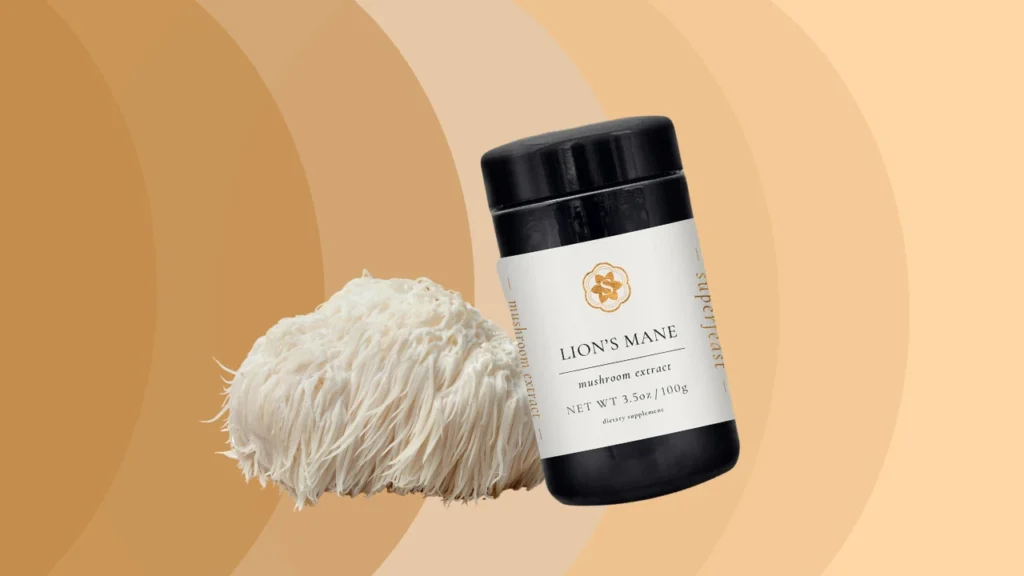In an era where cognitive demands are at an all-time high, the pursuit of mental clarity has become a top priority for countless individuals. According to recent industry reports, the global market for nootropic supplements is experiencing exponential growth, with an estimated value of over $2 billion. As individuals seek effective solutions to combat mental fatigue and enhance cognitive performance, the spotlight is increasingly turning to natural alternatives like nootropic mushrooms.
Among these nootropic mushrooms, lion’s mane has garnered significant attention for its potent neuroprotective and cognitive-enhancing properties. With research highlighting its ability to stimulate nerve growth factor (NGF) production in the brain, lion’s mane is emerging as a frontrunner in the realm of natural brain supplements. As a result, the demand for lion’s mane products has surged, with consumers eager to harness the brain-boosting benefits of this remarkable mushroom.
In this article, we’ll delve deep into the world of nootropic mushrooms, focusing specifically on the transformative powers of lion’s mane. From its ancient roots in traditional medicine to its modern-day resurgence as a powerhouse for mental wellness, we’ll explore the science behind this extraordinary fungus and its impact on cognitive function. Moreover, we’ll uncover how brands like SuperFeast are leading the way in providing high-quality lion’s mane supplements to meet the growing demand of health-conscious consumers.
You May Also Like:
What Are the Best Mushrooms for Brain Health? Here Are the Facts
The Best Mushroom Supplements for Memory: 5 Top Brands Reviewed
Unveiling the roots: the history and traditional applications of lion’s mane
Lion’s mane, scientifically known as Hericium erinaceus, boasts a rich history deeply rooted in traditional medicine systems such as Traditional Chinese Medicine (TCM) and Ayurveda. This distinctive mushroom, characterized by its cascading icicle-like appearance, has been revered for centuries for its medicinal properties and nutritional value.
Lion’s mane typically thrives in temperate regions of Asia, North America, and Europe, where it can be found growing on hardwood trees such as oak, beech, and maple. Its preference for specific environmental conditions, including moderate temperatures and high humidity, contributes to its relatively limited natural habitat.
From a nutritional standpoint, lion’s mane is a treasure trove of bioactive compounds, including polysaccharides, proteins, and antioxidants. These constituents not only provide essential nutrients but also confer a range of health benefits, making lion’s mane a valuable addition to traditional diets in regions where it naturally occurs.
Throughout history, lion’s mane has been revered for its diverse medicinal applications. In ancient China, it was traditionally used to support digestive health, boost immune function, and promote overall vitality. Similarly, in Japanese and Korean folk medicine, lion’s mane was prized for its ability to enhance cognitive function, alleviate symptoms of anxiety and depression, and improve general well-being.
In traditional medicine systems, lion’s mane was often prepared as a decoction, tea, or soup, allowing individuals to reap its medicinal benefits through regular consumption. Whether used as a tonic for vitality or a remedy for specific ailments, lion’s mane held a revered status in the pharmacopoeias of ancient cultures, symbolizing the profound respect for nature’s healing gifts.
The therapeutic potential of lion’s mane stems from its rich array of bioactive compounds, including hericenones, erinacines, and beta-glucans. These compounds have been studied extensively for their neuroprotective, anti-inflammatory, and antioxidant properties, which contribute to their efficacy in promoting brain health and cognitive function.

Unveiling the power of lion’s mane
Nootropic mushrooms have garnered widespread attention for their remarkable ability to enhance cognitive function and promote overall brain health. Among these natural wonders, lion’s mane stands out as a true superstar, revered for its neuroprotective and cognitive-enhancing properties. Rich in essential vitamins and minerals, lion’s mane offers numerous health benefits that extend far beyond its nootropic effects.
At the core of lion’s mane’s cognitive benefits lies its ability to stimulate the production of nerve growth factor (NGF) in the brain. NGF plays a crucial role in the growth, maintenance, and survival of neurons, which are the building blocks of the nervous system. By promoting neurogenesis and synaptic plasticity, lion’s mane supports the brain’s ability to adapt and learn, thereby enhancing memory, focus, and cognitive function.
In addition to its role in cognitive enhancement, lion’s mane boasts a nutritional profile that further contributes to its therapeutic potential. This mushroom is rich in vitamins and minerals essential for brain health, including B vitamins (such as B1, B2, B3, B5, and B6), potassium, zinc, and selenium. These nutrients play key roles in neurotransmitter synthesis, energy metabolism, and antioxidant defense, ensuring optimal brain function and protection against oxidative stress.
Moreover, lion’s mane contains bioactive compounds such as hericenones and erinacines, which have been studied for their anti-inflammatory and antioxidant properties. These compounds help mitigate neuroinflammation and oxidative damage in the brain, both of which are involved in the pathogenesis of neurodegenerative diseases like Alzheimer’s and Parkinson’s. By reducing inflammation and oxidative stress, lion’s mane supports brain health and may help protect against age-related cognitive decline.
The multifaceted benefits of lion’s mane extend beyond cognitive enhancement to encompass mood regulation, immune support, and digestive health. Studies have shown that lion’s mane has the potential to help alleviate symptoms of anxiety and depression by modulating neurotransmitter levels and promoting a sense of well-being. Additionally, its immune-modulating effects may enhance immune function, while its prebiotic properties could support a healthy gut microbiome, which is closely linked to overall health and cognitive function.
In summary, lion’s mane represents a potent ally in the quest for optimal brain health and mental clarity. With its unique combination of neuroprotective compounds, essential nutrients, and therapeutic properties, lion’s mane offers a holistic approach to cognitive enhancement and overall well-being. As we continue to unravel the mysteries of this extraordinary mushroom, we’ll gain a deeper appreciation for its profound impact on our mind and body.


Lion’s mane: the brain’s best friend
Lion’s mane mushroom emerges as a true champion in the realm of cognitive enhancement and brain health. With its ability to stimulate the production of nerve growth factor (NGF), lion’s mane fosters the growth and maintenance of neurons, facilitating the formation of new neural connections and enhancing overall brain function. Additionally, its potential to modulate inflammatory pathways and scavenge free radicals could help preserve neuronal integrity and function, thus safeguarding against cognitive decline and age-related cognitive impairments.
Furthermore, lion’s mane exerts beneficial effects on neurotransmitter systems, influencing the synthesis and release of key neurotransmitters like serotonin, dopamine, and acetylcholine. These neurotransmitters play crucial roles in regulating mood, cognition, and memory, and their dysregulation is associated with various neuropsychiatric disorders. By modulating neurotransmitter levels, lion’s mane may help alleviate symptoms of anxiety, depression, and cognitive dysfunction, promoting a balanced mental state and enhanced cognitive abilities.
Studies have also demonstrated the potential of lion’s mane to improve cognitive performance in various domains, including memory, attention, and executive function. Whether consumed as a dietary supplement or incorporated into culinary dishes, lion’s mane offers a natural and effective means to support cognitive health and enhance mental clarity.


Beyond mental clarity: exploring the additional benefits of lion’s mane
While lion’s mane is renowned for its ability to enhance mental clarity and focus, its therapeutic potential extends far beyond cognitive enhancement. Modern research has shed light on the diverse array of health benefits offered by this remarkable mushroom, making it a valuable addition to holistic wellness regimens.
One of the most notable additional benefits of lion’s mane is its potential to support immune function. Studies have shown that lion’s mane exhibits immunomodulatory effects, meaning it may help regulate the immune system’s response to pathogens and foreign invaders. By enhancing immune surveillance and bolstering immune defenses, lion’s mane may help reduce the risk of infections and promote overall immune health.
Moreover, lion’s mane possesses potent anti-inflammatory properties, which may benefit various aspects of health beyond cognitive function. Chronic inflammation is involved in the pathogenesis of numerous chronic diseases, including cardiovascular disease, diabetes, and autoimmune disorders. By modulating inflammatory pathways and reducing systemic inflammation, lion’s mane may help mitigate the risk of inflammatory-related conditions and promote overall well-being.
Additionally, emerging research suggests that lion’s mane may have therapeutic potential in supporting digestive health. As a prebiotic, lion’s mane provides nourishment to beneficial gut bacteria, helping to maintain a healthy balance of the gut microbiome. A healthy gut microbiome is essential for proper digestion, nutrient absorption, and immune function; disruptions in gut health have been linked to a myriad of health issues. By supporting gut health, lion’s mane may contribute to improved digestion, enhanced nutrient absorption, and overall gastrointestinal wellness.
From immune support and anti-inflammatory effects to promoting digestive health, this versatile mushroom has earned its place as a cornerstone of holistic wellness. As research continues to uncover its myriad of therapeutic properties, lion’s mane remains a potent ally in the pursuit of optimal health and vitality.


Harnessing the power of nature: SuperFeast Lion’s Mane
When it comes to sourcing high-quality lion’s mane products, SuperFeast stands out as a commendable brand in the realm of natural health supplements. Their lion’s mane mushroom powdered extract is meticulously crafted from premium-grade mushrooms, ensuring maximum potency and efficacy. With a commitment to purity and sustainability, SuperFeast takes great care in selecting only the finest ingredients to create their lion’s mane formula.
SuperFeast Lion’s Mane is a nutritional powerhouse, boasting a rich array of vitamins, minerals, and bioactive compounds essential for brain health and overall well-being. Each serving of SuperFeast Lion’s Mane provides a potent dose of B vitamins, including B1, B2, B3, B5, and B6, which play crucial roles in energy metabolism, neurotransmitter synthesis, and cognitive function. Additionally, SuperFeast’s formula is rich in minerals such as potassium, zinc, and selenium, which help support various physiological processes and contribute to overall health.
The unique extraction process utilized by SuperFeast helps ensure that the bioactive compounds present in lion’s mane, such as hericenones and erinacines, are preserved in their most potent form. By harnessing the power of nature and employing holistic creation methods, SuperFeast delivers a lion’s mane formula that is both potent and pure, ensuring maximum therapeutic benefits for the mind and body.
Furthermore, SuperFeast Lion’s Mane is specifically formulated to enhance cognitive function and promote mental clarity. The synergistic combination of bioactive compounds present in lion’s mane, along with the carefully calibrated extraction process used by SuperFeast, helps ensure that each serving delivers maximum cognitive benefits. With lion’s mane’s potential in supporting NGF production, modulating neurotransmitter levels, and reducing neuroinflammation, SuperFeast Lion’s Mane may help sharpen focus, improve memory retention, and enhance overall cognitive performance.
Additionally, with lion’s mane’s anti-inflammatory, immune-modulating, and prebiotic properties, SuperFeast Lion’s Mane may help promote a balanced immune system, support digestive health, and contribute to overall vitality. Whether added to your morning smoothie, brewed into a nourishing tea, or incorporated into culinary creations, SuperFeast Lion’s Mane offers a convenient and effective way to harness the therapeutic potential of this remarkable mushroom.


Incorporating lion’s mane into your holistic wellness
The journey to optimal cognitive function and mental clarity is a multifaceted one, and embracing the power of nootropic mushrooms like lion’s mane offers a natural and effective way to elevate your mind. By incorporating lion’s mane into your daily routine, whether through dietary supplements or culinary creations, you can tap into the rich array of bioactive compounds and nutrients that support brain health and cognitive function. Moreover, the holistic benefits of lion’s mane extend beyond just cognitive enhancement, encompassing immune support, anti-inflammatory effects, and digestive health.
Research suggests that additional holistic approaches to mental wellness, such as mindfulness meditation, yoga, and herbal supplementation, can further yield significant benefits for enhancing mental health and cognitive function. Multiple studies, including those published in the Journal of the American Medical Association (JAMA), have found that mindfulness-based interventions are associated with reduced symptoms of anxiety, depression, and stress. Similarly, studies have shown that regular physical activity, such as yoga or tai chi, may improve mood, cognitive function, and overall quality of life.
In contrast to pharmaceutical interventions, which often come with a myriad of potential side effects and long-term health risks, holistic practices like incorporating lion’s mane mushroom into your daily routine offer a potentially safer and more sustainable approach to mental wellness. Lion’s mane, with its natural origins and minimal risk of adverse effects, provides a potent source of cognitive support without the drawbacks associated with pharmaceuticals. Nonetheless, it is important to note that health supplements are not FDA-approved; they cannot diagnose, treat, or cure any disease or health condition. Supplements should be used only as an adjunct to conventional treatment under the supervision of a healthcare professional.
By nourishing your body and mind with the goodness of nature, you can cultivate a balanced and resilient system that thrives in the face of modern-day stressors. As you embark on your journey to enhanced mental wellness, remember to prioritize self-care, mindfulness, and holistic living. With lion’s mane as your ally, you can unlock your full cognitive potential and embrace a life of clarity, vitality, and well-being.


Additional Reading:
Medical News Today: What Are Vitamins, and How Do They Work?
HelpGuide.Org: How to Improve Your Memory
University of New Hampshire: How Might Our Gut Health Affect Our Mental Health?
Northwestern Medicine: What is Traditional Chinese Medicine?
EveryDay Health: 10 Brain Exercises That Boost Memory
Important Note: The information contained in this article is for general informational purposes only, and should not be construed as health or medical advice, nor is it intended to diagnose, prevent, treat, or cure any disease or health condition. Before embarking on any diet, fitness regimen, or program of nutritional supplementation, it is advisable to consult your healthcare professional in order to determine its safety and probable efficacy in terms of your individual state of health.
Regarding Nutritional Supplements Or Other Non-Prescription Health Products: If any nutritional supplements or other non-prescription health products are mentioned in the foregoing article, any claims or statements made about them have not been evaluated by the U.S. Food and Drug Administration, and such nutritional supplements or other health products are not intended to diagnose, treat, cure, or prevent any disease.
